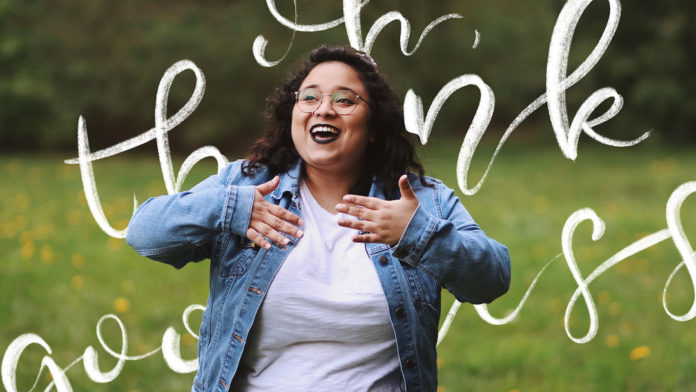Recent UFV graduate Shannon Pahladsingh graciously set aside some time this week to talk with The Cascade about her experience winning the BMO 1st Art! Award and creative process behind her iconic spoken word poem, “oh, thank goodness.”
How does it feel to be selected as the B.C. regional winner of the nineteenth annual BMO 1st Art! competition?
It feels amazing, first and foremost, but it also feels kind of surreal because I wasn’t expecting to win … because it was the first time I went into poetry. I am usually a dry media kind of artist. You never think that your little project is going to win this huge competition with a monetary prize … I just feel so lucky.
How does it feel to have your artwork showcased in the virtual art museum at the University of Toronto?
It feels so good … Having that platform to say my message and share my experience, especially with other Indigenous, Black, and people of colour. It feels so heartwarming. I am just so happy that [this] poem can exist for my community.
In terms of your art, do you have any plans for the [$7,500] prize money that you received?
Other than squirreling it away for my student loan, I am thinking of donating some of the money to a local Indigenous group … I just figured this poem wouldn’t be what it is if I wasn’t here, a settler in Canada and recognizing that positionality that I hold.
Can you elaborate on the process of the competition and how you were nominated for this award?
This poem was actually my grad project for my senior year at UFV … one of the other art professors saw it, her name was Davida Kidd. She let me know that [she] really thinks this is a strong project … [and that I] should submit it to BMO. I followed all of the steps to submitting and … a few weeks later, I got the call from someone at BMO… and she [said] it was almost unanimously decided, and that really touched my heart. She told me I was the first person to win out of UFV … She was telling me that the middle of the poem where it changes direction from “Oh, thank goodness you are so diverse” to “oh, thank goodness you are so adverse” was the moment that hooked everyone and … that’s the moment that I wanted to hook my listeners. I was very happy to hear the prestigious judges were in that moment of feeling my story with me.
Could you elaborate on your artistic choice of filming outside in a field. What was your artistic decision to do that?
I was gonna perform the poem in an office because [it] was about covert racism in the workplace. But then, as I tried it, it just wasn’t feeling right. And I was thinking, why am I performing this poem in a setting that has harmed me? So, I took it in a different direction. The land that I am on is actually a place that I go to a lot, and I first discovered it when I was having an anxiety attack because of something my boss had said at the time … it just holds a really special meaning to me. There are little hawks that fly around and you can hear them singing. I thought, this poem is supposed to be healing; let me go to a place of healing for me … It just fit better than an office space because … the poem is not really supposed to be emphasizing the pain. It’s supposed to be emphasizing the healing and empowering that can come from it.
How long did it take for you to write the poem?
Good question. This poem was actually in the works for three years. It started as a political science essay and then morphed into a philosophy essay on feminism … because this incident happened the same time I was taking political science and … I was wrestling with why did this line hurt me so much? Why did I keep thinking about it? … And slowly one night, I was just in the shower venting at myself [chuckles], and [I realized that] this was a poem. And so, I quickly got out of the shower and wrote down what I was venting.
What are your plans moving forward as an artist?
What I am working on with a group of other folks is a non-profit that is geared only toward Indigenous, Black, and people of colour, offering them a space where they can echo out. When I am in a space where there are white people, I put on a mask and make sure … [I] don’t act too Brown. We wanted to create a space, especially in Abbotsford where we don’t really have this conversation as a community. We wanted to create that space of come in, take off that mask, and come vent or come participate in your culture … and this will be a [place] where hopefully you feel empowered and supported. That is kind of the premise for this non-profit. It is for folks who have experienced racialized harm in academic institutions where we don’t talk enough about or more so, take action against it. Racism is treated like a dirty r-word, and it’s not… It’s something that we need to talk about and acknowledge if we want to move past it and not participate in it.
Please check out Pahladsingh’s work from Nov. 16 to Dec. 8 online.
This interview has been edited for length and clarity
Image: Shannon Pahladsingh
Rachel is working towards a BA with a concentration in English and Theatre. She has been employed at The Cascade since Fall 2021 as a Staff Writer and a Jr. News Editor. Currently, she is the sectional News Editor and enjoys meeting and interviewing people as well as taking long walks in nature. Rachel also likes to stay up to date on the latest trends and informs students through her fashion column entitled Campus Fashion.



